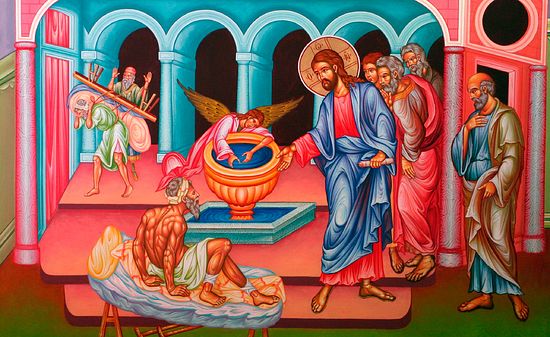Christ is Risen! Truly He is Risen! Hristos Voskrese, Vaistinu Voskrese
Χριστὸς ἀνέστη! Ἀληθῶς ἀνέστη!
On the Fourth Sunday of Pascha, the Orthodox Church commemorates one of Christ’s most tender and powerful miracles—the healing of the paralytic at the Pool of Bethesda. Found in the Gospel of John 5:1–15, this event speaks not only to physical healing but to spiritual restoration, divine compassion, and the hope we have in the Risen Lord.
“Rise, take up your bed, and walk.”
These simple yet powerful words changed a man’s life forever.
For thirty-eight years, the man lay paralyzed beside the Pool of Bethesda, near the Sheep Gate in Jerusalem. This pool was believed to have healing properties when stirred by an angel. But only the first person to enter the water would be healed—and this man had no one to help him.
Jesus, seeing him lying there, asked, “Do you want to be made well?” (John 5:6). The man did not beg or demand. He simply shared his sorrow:
“Sir, I have no man to put me into the pool when the water is stirred.”
Then came Christ’s command:
“Rise, take up your bed, and walk.”
Instantly, the man was healed.
A Miracle Within the Feast
This miracle happened during the Jewish Passover, a time when crowds filled Jerusalem. The Pool of Bethesda, also known as the Sheep’s Pool, was located near where sacrificial lambs were washed before being offered in the Temple. The connection is rich in symbolism: just as lambs were prepared for sacrifice, Christ, the Lamb of God, came to offer Himself—and with that offering came healing and new life.
Christ performed this miracle on the Sabbath, prompting confrontation from religious leaders. But Jesus revealed something deeper: He is Lord of the Sabbath, and it is always lawful to do good, especially to restore life.
A Deeper Message: Spiritual Paralysis
The paralytic waited nearly four decades for healing. Yet Jesus came to him—not because of his effort, but out of divine compassion. Likewise, we too may find ourselves spiritually paralyzed—stuck in sin, routine, despair, or doubt. The Kontakion of the day captures this truth beautifully:
“I am grievously paralyzed in a multitude of sins and wrongful deeds.
As You raised up the paralytic of old, also raise up my soul by Your divine guidance,
that I may cry out, ‘Glory to Your power, O compassionate Christ!’”
Christ doesn’t just heal bodies—He heals hearts. He speaks into the quiet corners of our lives and calls us to rise.
Water and Healing: From Old Testament to Baptism
Many of God’s miracles involve water—foreshadowing the mystery of Baptism:
The Red Sea parted for the Hebrews to pass to freedom (Exodus 14).
Water flowed from the rock at Horeb to quench Israel’s thirst (Exodus 17).
Gideon used dew to seek God’s will (Judges 6:36–40).
Likewise, the Pool of Bethesda brought healing to one person at a time. But Christ offers healing to all through the waters of Baptism—cleansing us from every sin and giving new life.
The Icon and the Angel
In the icon of the Sunday of the Paralytic, Christ is seen commanding the man to rise. Behind them is the pool, with its five porches crowded with the sick. Tradition holds that the Archangel Michael was the one who stirred the water—a heavenly reminder of God’s mercy.
In the Canon of the Paralytic, we call on Saint Michael to protect us and intercede for us:
“Guide us on the paths of life…” (Ode 6)
“Protect us from the passions…” (Ode 3)
“Deliver us from our offenses…” (Ode 8)
The Deeper Healing: “Sin No More”
After the miracle, Jesus found the man in the Temple and said,
“See, you are well again. Stop sinning, or something worse may happen to you.” (John 5:14)
This reminds us that physical healing is not the end—it points to something greater: repentance and transformation. Some suffering is caused by sin, but not all. In this man’s case, Jesus gently revealed that his healing must lead to a changed life.
A Lesson for All of Us
The five porches of the Sheep’s Pool have been interpreted by the Fathers as symbols of the five senses, through which sin often enters. Israel, like all of us, had become “paralyzed” in sight, hearing, taste, smell, and touch—unresponsive to God’s presence.
Yet Christ came not only to heal the man at the pool, but to restore all of humanity. This is why we remember this miracle during the Paschal season—a time of life, light, and Resurrection.
Celebrating the Sunday of the Paralytic
On this fourth Sunday after Pascha, we celebrate with the Divine Liturgy of Saint John Chrysostom, beginning with the joyful Paschal Troparion:
“Christ is risen from the dead,
Trampling down death by death,
And upon those in the tombs bestowing life!”
Scripture Readings:
Epistle: Acts 9:32–42
Gospel: John 5:1–15
A Final Thought
This Sunday is not just about a man healed long ago. It’s about you and me—about anyone who feels stuck, unseen, or spiritually immobile. Christ comes to us and asks:
“Do you want to be made well?”
And to those who say yes, He says with power:
“Rise, take up your bed, and walk.”
May Christ our God, through the prayers of the Archangel Michael and all the saints, heal us of every infirmity—bodily and spiritual—and lead us into the joy of His Resurrection.
Christ is Risen! Indeed He is Risen!

